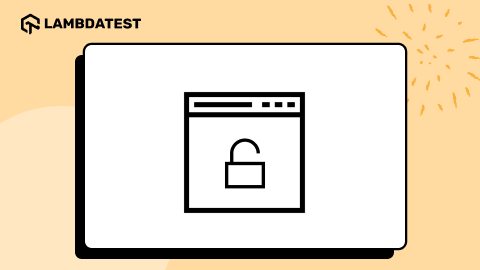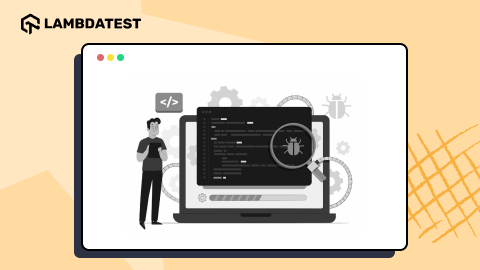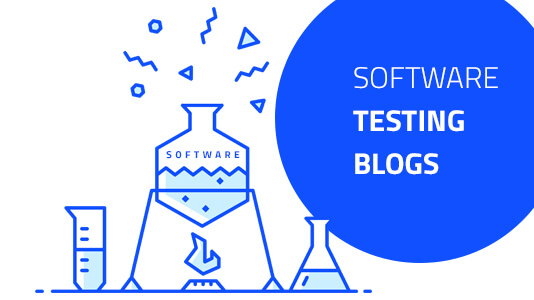Black Friday and Cybеr Monday: How to Tеst Wеbsitеs and Mobilе Applications
Harish Rajora
Posted On: November 19, 2024
![]() 131456 Views
131456 Views
![]() 16 Min Read
16 Min Read
Thanksgiving has arrived, and what that means is that the shopping season is about to get started with Black Friday and Cyber Monday (BFCM). While customers seek the best deals they can get, retailers try to curate attractive deals to lure maximum customers to their websites and mobile applications.
Issues such as downtime, slow loading times, buggy interfaces, or security gaps can turn eager buyers away in just a few seconds. It goes without saying that online businesses need to pull up their socks when testing their website or mobile applications to ensure a smooth shopping experience during Black Friday or Cyber Monday.
In this blog, we’ll walk you through how to test websites and mobile applications and make them ready for the BFCM event.
TABLE OF CONTENTS
- What Is Black Friday and Cybеr Monday?
- Will Black Friday and Cyber Monday See Big Sales in 2024?
- How to Test Websites and Mobile Applications for BFCM?
- Bonus: Harness KaneAI for Black Friday and Cyber Monday
- Testing Techniques for Black Friday and Cyber Monday
- Testing Checklist for Black Friday and Cyber Monday
- Impact of Black Friday and Cyber Monday on Stakeholders
- Frequently Asked Questions (FAQs)
What Is Black Friday and Cybеr Monday?
Black Friday and Cybеr Monday arе onе of thе largеst shopping еvеnts in thе US that comе aftеr Thanksgiving.
In the United States (US), Black Friday is the Friday that falls after Thanksgiving. This is regarded as the unofficial beginning of the shopping season, where retailers sell products at huge discounts and attractive deals. Black Friday usually goes on in-store with limited quantities. But now, things are very different since many sales take place online as well.
Cybеr Monday is an online shopping event that comes after Black Friday. It offers deals on technical products. However, over the years, it has become much more than just tech. So, almost everything goes on sale nowadays.
Test websites and mobile applications across 3000+ real environments. Try LambdaTest Now!
Will Black Friday and Cyber Monday See Big Sales in 2024?
According to Adobe, in 2024, during the holiday season, online spending is expected to be around $241 billion, which is 8.4% growth compared with 2023.
For Black Friday, in 2023, US onlinе spending was around $9.8 billion. This year, in 2024, onlinе spending is expected to hit аround $10.8 billion.
The expected growth in Black Friday shows customer’s reliance on online shopping for major discounts. This presents opportunities for businesses to capitalize on high customer demand by optimizing their websites for high traffic, offering personalized promotions, and enhancing customer service.
Cybеr Monday saw an even bigger spend, $12.4 billion in 2023. In 2024, it is expected to grow and be around $13.2 billion. You can expect to see even greater customer engagement, signaling that they continue to prioritize convenience and deals after Black Friday.
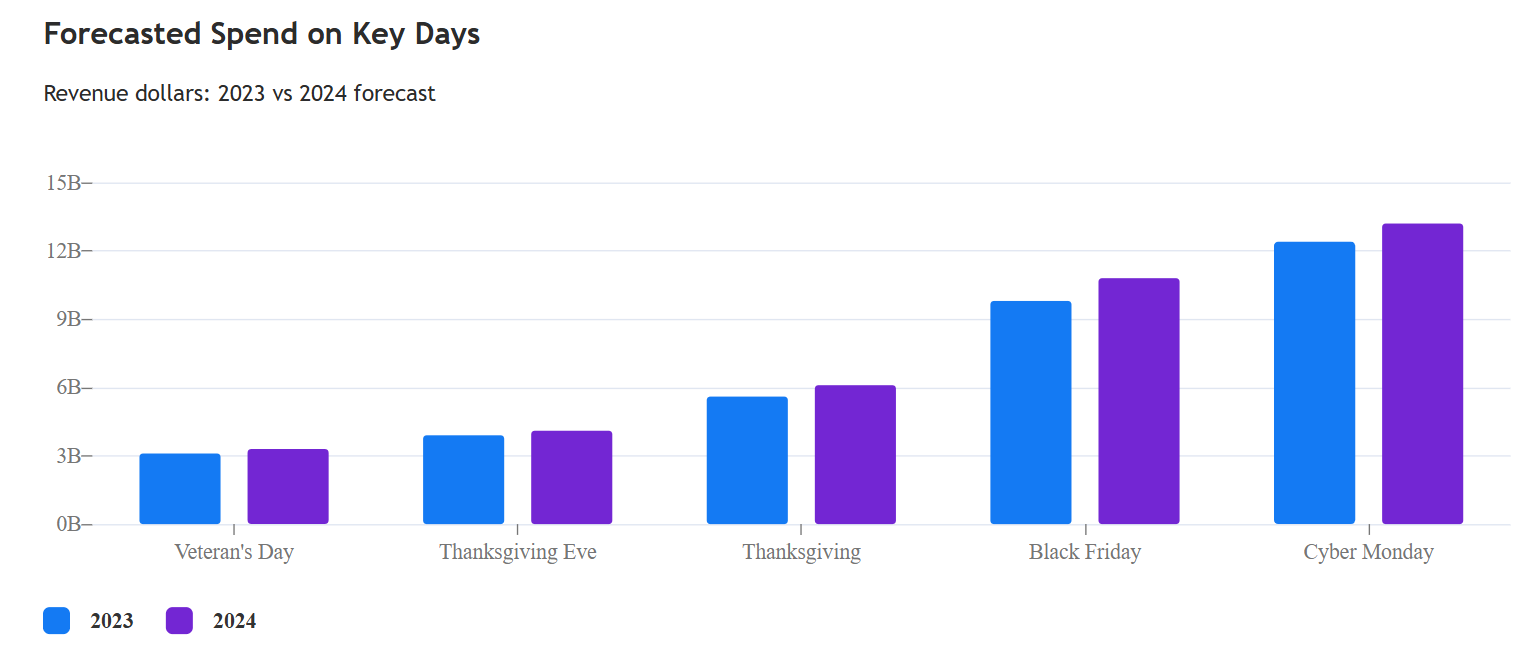
Forecasted revenue share by device type (Nov 1st – Dec 31st, 2024):
- Desktop and Others: 46.8%
- Mobile: 53.2%
During the 2024 holiday season, mobile shopping is expected to bring in 53.2% of revenue, while desktops and other devices will account for 46.8%. It shows that more people prefer shopping on their mobile devices.
So businesses should make sure their mobile applications work smoothly with fast loading and easy checkout options.
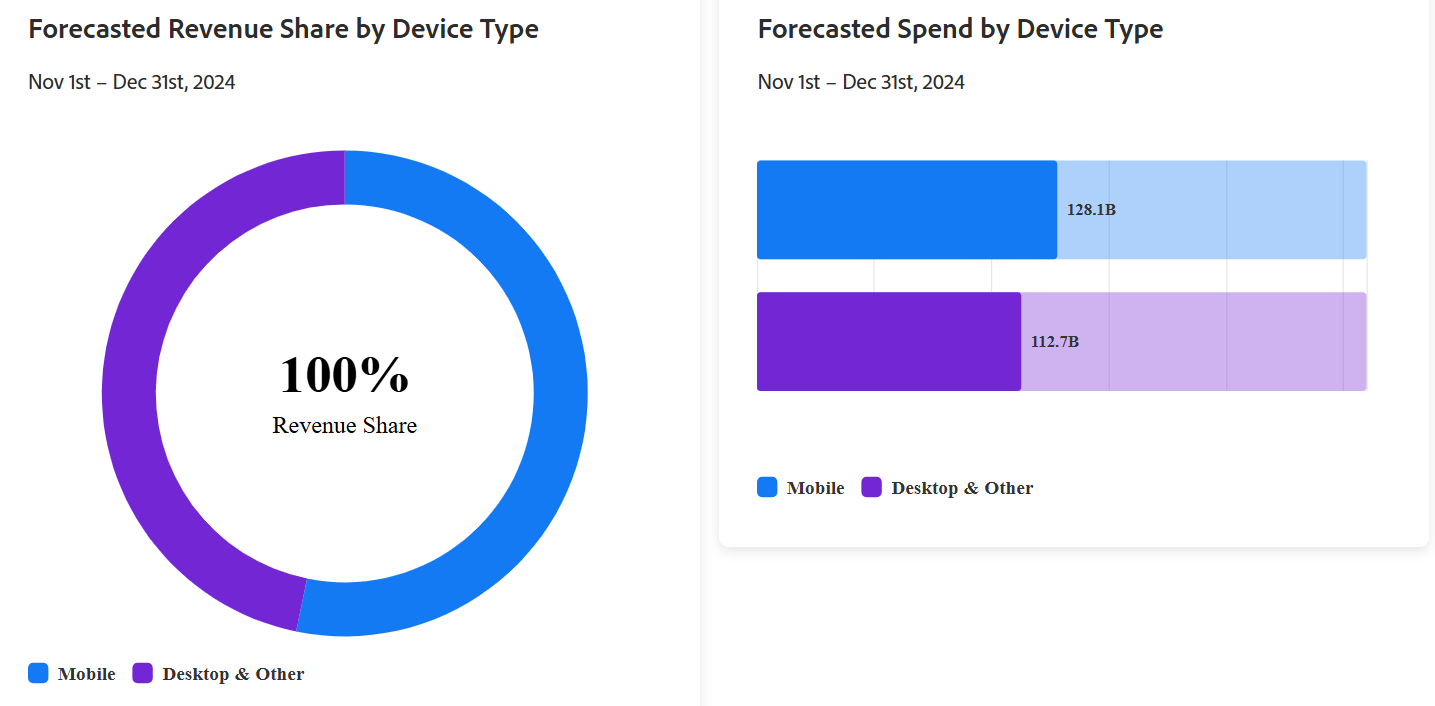
Forecasted spend by device type (Nov 1st – Dec 31st, 2024):
- Desktop and Others: 112.7B
- Mobile: 128.1B
In terms of spending, mobile users are expected to spend $128.1 billion, compared to $112.7 billion on desktops and other devices. While mobile takes the lead, desktops still play an important role. Therefore, businesses need to ensure a seamless shopping experience on all mobile devices.
How to Test Websites and Mobile Applications for BFCM?
Black Friday and Cyber Monday are peak shopping events, drawing millions of online buyers. To capitalize on this surge, businesses must ensure their websites and mobile applications perform seamlessly under high traffic. Any glitches or slowdowns can lead to lost sales and damage the brand’s reputation. Testing ensures smooth performance, enhances user experience, and supports successful BFCM campaigns.
A feasible approach here is to leverage a cloud-based testing platform. One such platform for cloud testing is LambdaTest. It is an AI-powered test execution platform that allows developers and testers to perform manual and automated testing at scale across 3000+ web browsers online.
For example, to run real-time cross-browser tests on the LambdaTest platform, you can follow the below steps:
- Login into your LambdaTest account and navigate to Real Time > Browser Testing.
- Enter the website URL you want to test. Then, select your desired operating system. Then, select the browser, browser version, and resolution.
- Click on the Start button.
Here is the snap of the cross-browser tests run on the LambdaTest platform:
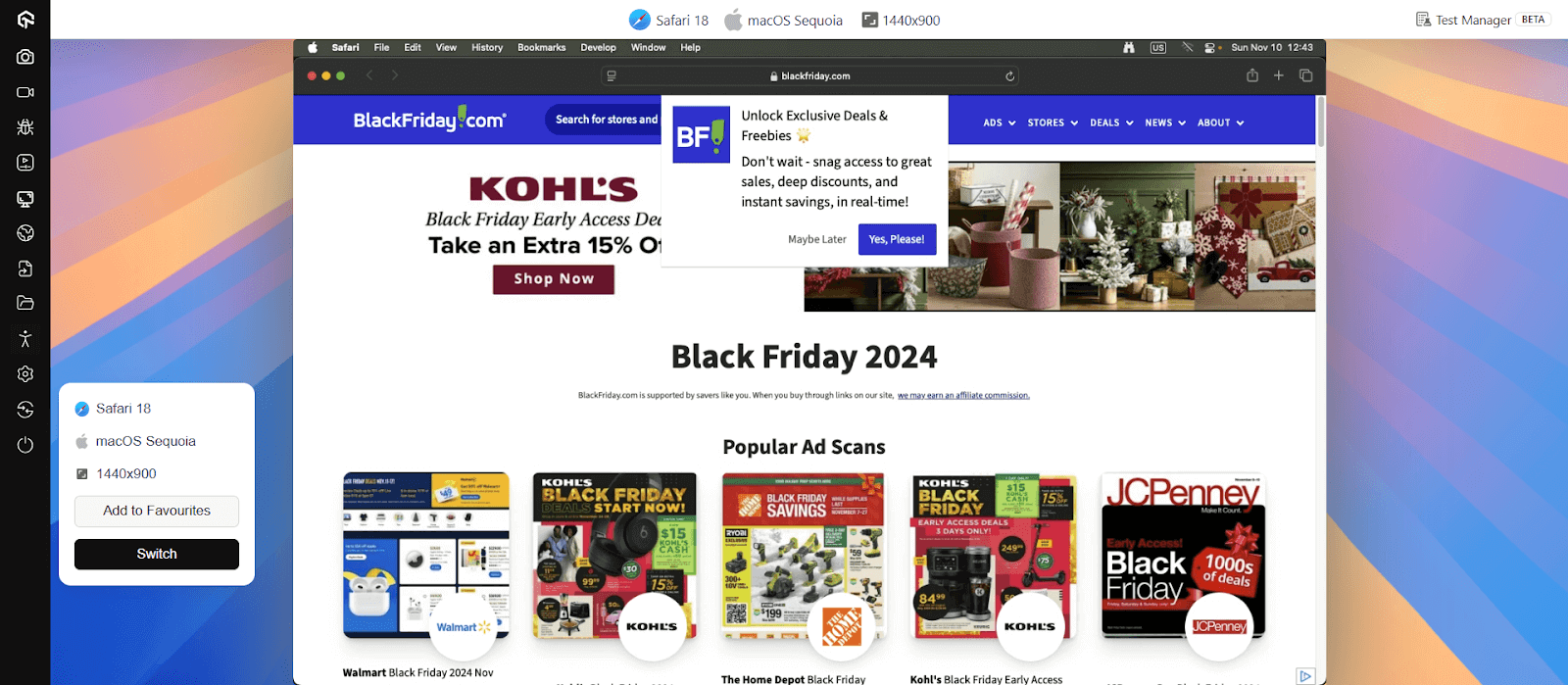
Refer to this guide to get started with desktop browser testing on LambdaTest.
When it comes to performance testing, LambdaTest offers HyperExecute, an end-to-end test orchestration platform that lets you run performance tests using tools such as JMeter. HyperExecute offers test execution, which is up to 70% faster than any other cloud grid.
Here is the snap of the performance tests run on HyperExecute:
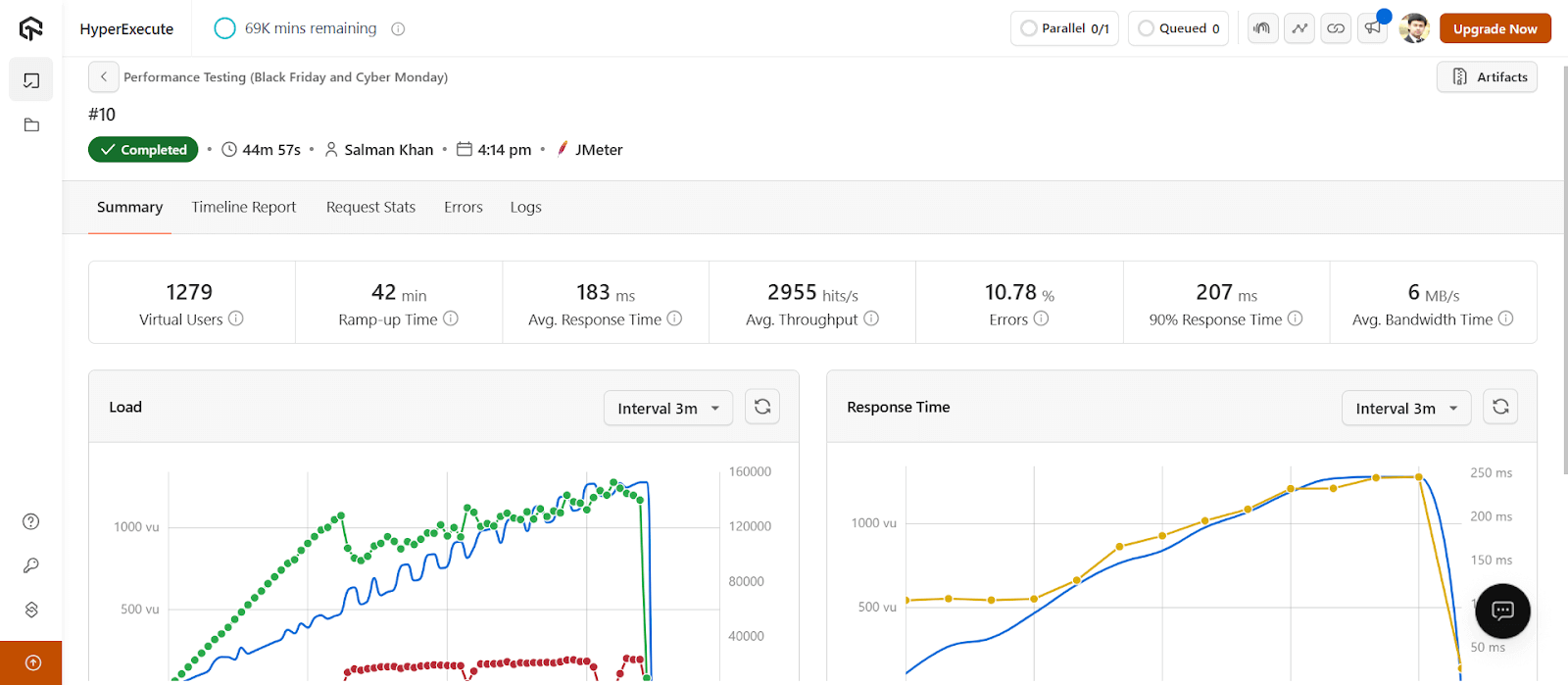
To get started, check out this guide on performance testing with HyperExecute.
As we discussed above, prioritizing the mobile-first approach is crucial since most of the traffic comes from mobile devices. It ensures your websites are optimized for different screen sizes. For this, LambdaTest offers a responsive testing tool known as LT Browser that allows you to run mobile-friendly tests across 53+ device viewports such as mobile, tablet, desktop and laptops.
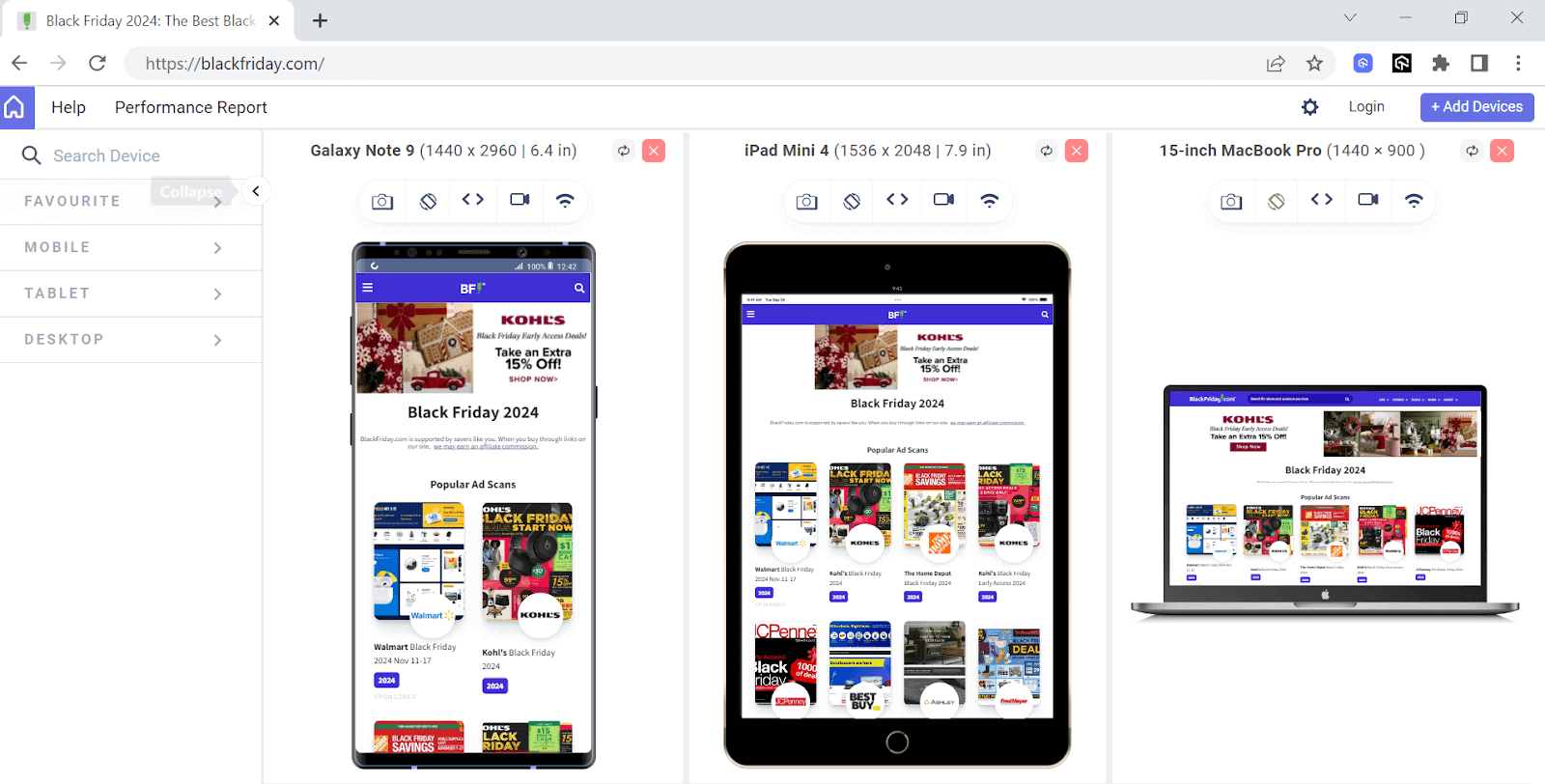
Bonus: Harness KaneAI for Black Friday and Cyber Monday
You can leverage AI in your BFCM testing using AI-driven test agents such as KaneAI.
KaneAI by LambdaTest is an end-to-end software testing agent for high-speed quality engineering teams that lets you create, write and debug automated tests using natural language commands.
With KaneAI, you can:
- Create and evolve tests through natural language-based instructions.
- Generate and automate steps with high-level objectives.
- Convert automated tests in different programming languages and testing frameworks.
- Convert your actions into natural language commands using smart show-me mode.
- Synchronize your code changes with natural language commands.
- Integrate KaneAI with tools such as Slack and Jira.
To get started, head over to the documentation on getting started with KaneAI.
Testing Checklist for Black Friday and Cyber Monday
As eCommerce thrives, ensuring a smooth and secure shopping experience has never been more crucial. So, here is a testing checklist for BFCM to ensure a seamless shopping experience for your customers.
- Simulate Heavy Website Traffic With Load Testing: Brands witness a surge in visitors during BFCM, causing traffic spikes several times higher than their daily averages. This sudden increase in traffic often results in crashes, slow-loading pages, and downtime for websites and mobile applications.
- Have an Effective Server Configuration: If you have the right hardware, it is still necessary to have an effective server configuration to handle the overwhelming surge of traffic. During high-traffic events like Black Friday and Cyber Monday involves implementing standby solutions and load balancers.
- Test Website Updates for Seamless UX: Websites and mobile applications often receive fresh upgrades. It typically involves spicing new banners, pages, links, colors, and other cool stuff to lure in online shoppers and help them find what they want.
- Implement Cross-Platform Testing for a Hassle-Free BFCM: As mentioned above, mobile devices account for greater revenue. It highlights the importance of better responsiveness and user-friendliness for mobile shopping success on smaller displays.
- Test Server-Side Synchronization for Managing Product Catalog Updates: Testing server-side synchronization is essential. Sellers have limited products, so updating the catalog during heavy Black Friday and Cyber Monday traffic is crucial to prevent customers from thinking products are still available when they’ve sold out. This caution is essential on regular days as well.
- Perform UI/UX Testing of Coupon Codes: Some organizations pre-apply discounts for quicker order processing, while others offer coupon codes for customers, like certain credit card offers.
- Test for Smoother Transactions: The trickiest stage in completing the order is the payment options. It’s tricky because you have no control over it. You are not managing the gateway servers, not managing their APIs, and not managing a customer’s preference.
- Run Security Tests: Amidst the surge in online retail, especially on peak shopping days like Black Friday and Cyber Monday, eCommerce platforms have become prime targets for cybercriminals. Consequently, safeguarding sensitive customer information and combating fraudulent activities, data breaches, and card leaks has become more crucial than ever.
- Test Geolocation to Ensure Global Reach: Every year, platforms like Amazon, Alibaba, or eBay welcome thousands of global exporters and small businesses to showcase their products and services on their platforms. However, no platform wants to violate legal rules and regulations and sell something not allowed in a country or a region.
With load testing, we can intentionally increase the traffic in the testing environment and determine the threshold of our overall system. It may include your server threshold, hardware threshold, network, etc.
These act as backup servers to ensure uninterrupted service when the primary server is under heavy load. Load balancers distribute traffic evenly across multiple servers, preventing overload and maintaining stable performance by intelligently routing requests based on server health and capacity.
Testing these updates to ensure they work smoothly is super important. After all, you’ve put in a lot of effort to provide a top-notch experience, and it’ll be tough to keep that going if you skip this step.
In such a situation, regression testing can help verify that updates to your website or mobile application do not impact the existing features.
Testing this is not an easy job; frankly, there are so many scenarios that it is hard to predict them all. For example, a customer can abandon the product on the payment page without deleting it from the cart.
One of the strategies is analyzing the quantity at regular intervals. Multiple testers can initiate this by considering the same product for parameters other than quantity, such as price, location availability, etc.
Testing for your coupon code is one of the priorities on the Black Day offer. For example, would you want your customer to enter the code in capital letters? Your customer also should not be able to club multiple offers on the same product. You can also perform Black Friday testing for credits and coupon combinations if they exist on your web application, etc.
While performing Black Friday and Cyber Monday testing, check for all these payment methods regularly and repeatedly. Verify if they can take the load and make multiple simultaneous payments. Check for these methods by throttling the network to bandwidths such as 2G, 3G, and 5G. You should also check all these options for both the website and the mobile application (if you have any).
When it comes to security concerns, security testing plays a crucial role in helping to protect against cyber attacks. It will assess your system, software application, or network for vulnerabilities and gaps that hackers can exploit. Identifying and addressing these gaps can save you and your buyers from an unpredictable cyberattack.
Additionally, installing an SSL certificate to transition from HTTP to HTTPS allows secure data transfer and protects sensitive customer information ( credit card details or contact info) during server-website interactions.
This demands careful and exhaustive testing from the testers. Geolocation testing for BFCM will enable you to create and launch tests of your websites and mobile applications and analyze and compare the audience reactions and behavior based on their location, language, device, operating system, etc.
Testing Techniques for Black Friday and Cyber Monday
Black Friday and Cyber Monday have a lot to offer, and a bad user experience can impact sales. Thus, comprehensive testing is required to ensure the eCommerce experience is seamless. For this, there are different software testing techniques that you can perform to check various aspects like functionality, user experience, performance, security, and more.
Functional Testing:
- Validate the checkout flow from adding items to the cart to payment confirmation.
- Ensure accuracy and speed on product search and filtering.
- Test websites and mobile applications on different types of browsers, browser versions, and operating systems.
User Experience (UX) Testing:
- Collect feedback from real-world users about friction points.
- Do experiment with different design elements for better conversion rates.
- Follow the mobile-first approach for an ultimate shopping experience on small-screen devices.
Performance Testing:
- Test the page loading speed to lower bouncing rates.
- Compress the image to increase page loading speed.
- Ensure your websites or mobile applications implement a cache to reduce server loads while improving your response times.
- Simulate high traffic with load testing tools to identify bottlenecks and ensure performance isn’t compromised.
- Push the website or mobile application beyond its limits to identify at what point it will break.
Security Testing:
- Scan for malware/viruses to ensure all customer data is safe.
- Simulate cyber-attacks to test the vulnerability of websites or mobile applications.
- Test payment gateways to ensure payments are secure and approved by the industry compliance standard.
Error Handling and Monitoring:
- Create a mechanism to handle errors efficiently.
- Monitor errors and performance issues in real-time.
- Set up alerts that notify potential critical issues.
These are some of the testing techniques that you can implement to ensure your websites and mobile applications perform as intended during online sales and peak shopping time.
You can also check out these eCommerce test case templates covering essential aspects like functionality, usability, performance and security for peak sale periods.
In high-traffic periods like Black Friday and Cyber Monday, customers expect fast and seamless performances. So, there will be an urgent need for thorough testing to prevent any system breakdowns. In particular, when it comes to testing for BFCM, developers and testers can opt for a cloud testing approach due to benefits it offers like scalability, reliability, fast test execution and much more.
Impact of Black Friday and Cyber Monday on Stakeholders
During Black Friday and Cyber Monday, most of the purchases happen online, especially after 2020.
Impact on Customers
In most countries, customers prefer shopping online rather than offline. This is because there are many more options, and the online stores are easy to access. In a short time, they can see thousands of products and choose among them. However, the stocks of any product are always limited, and therefore, customers are in a rush to buy the product first before it is sold out.
Another thing that a customer should expect is the result of such a high spike in traffic at a given moment. Black Friday usually sees a lot of website downtime as it is the first day of a shopping spree, and the backend team of the application might easily underestimate the number of customers by a ballpark. While the customers may have a lot of other options, those may also show slower behavior than usual.
Impact on Sellers
If customers are all prepared, the next to make Black Friday as successful as predicted are the sellers who sell their products on third-party stores like Amazon or their official websites or mobile applications.
These sellers may see the following impact:
- A chance to move overstocked or unsold products quickly.
- A significant increase in customer sign-ups as shoppers flock to deals.
- Potential losses from offering steep discounts or competitive pricing.
- Logistical challenges, including handling high order volumes and timely deliveries.
- A need to restock popular SKUs to keep up with demand.
Impact on Developers
Developers are the people who need to build robust websites and mobile applications for Black Friday and Cyber Monday. It is a slightly different challenge than other types of events, for instance, sports streaming websites, since we know when the customers will start joining the website and when they will leave. Therefore, developers will have a different impact on themselves and need to deal with it differently than what was discussed in the previous sections.
They may experience the following impact:
- Prepare to hire additional staff to manage the surge in demand.
- Expect unusual shopping patterns and unpredictable customer behavior.
- Be ready to allocate extra resources for operations and support.
- Ensure your system architecture is optimized to handle heavy traffic.
- Expand testing efforts to cover more areas and increase testing intensity to avoid disruptions.
Impact on Testers
Finally, testers are the ones who ensure the quality of websites and mobile applications. They are the ones who need to do most of the work when it comes to Black Friday and Cyber Monday. Their job is more important as business revenues depend on the quality of the software application – a metric guaranteed and stamped by the testing team.
However, they may experience the following impact:
- Ensure software applications handle massive loads as traffic surges.
- Ensure shoppers access websites and mobile applications from different browsers, devices and operating systems.
- Make sure software applications handle API calls in case of spikes.
- Make sure all payment interfaces perform flawlessly.
- Ensure software applications quickly respond to potential chaos.
Wrapping Up!
With Black Friday and Cyber Monday approaching, it is critical to ensure that both your website and mobile applications perform at scale and give customers the best shopping experience. You can use the testing techniques discussed in this blog. However, to achieve scalability and reliability, you can leverage AI-powered testing platforms like LambdaTest and get comprehensive testing coverage.
Frequently Asked Questions (FAQs)
How long does Cyber Monday last?
Cyber Monday generally lasts one day, but some retailers extend deals all week long under the heading of “Cyber Week.
What date is Black Friday sales in 2024?
Black Friday sales in 2024 will be on Friday, November 29.
What comes after Black Friday?
Cyber Monday falls after Black Friday and represents a day for shoppers to do their holiday online shopping deals.
How do I make an offer on Black Friday?
To make for an effective Black Friday offer, you have to plan out the discounts in a manner that can capture the customer’s attention and promote offers early through social media, as well as consider bundling some products or having limited-time offers to create a sense of urgency.
Got Questions? Drop them on LambdaTest Community. Visit now







